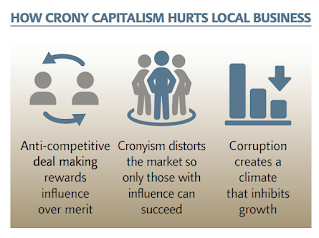How Crony Capitalism Corrupts the Free Markets
In a true free market, competition thrives on the principles of merit and fairness, allowing the best products and services to rise to the top. However, when crony capitalism takes root, these principles are undermined, leading to a distortion of market dynamics and a significant erosion of economic efficiency and equity.
Defining Crony Capitalism
Crony capitalism refers to an economic system in which business success is heavily influenced by close relationships between business leaders and government officials. Rather than competing on the basis of quality, innovation, and efficiency, businesses gain advantages through preferential treatment, subsidies, regulatory favors, and other forms of government intervention that disadvantage their competitors. This practice undermines the foundation of a free market, where success is determined by market forces and consumer choice.
The Erosion of Fair Competition
One of the most profound impacts of crony capitalism is the erosion of fair competition. In a free market, companies must innovate and improve their offerings to attract customers and sustain growth. However, crony capitalism allows certain businesses to bypass this crucial aspect of market dynamics. By securing favorable regulations, tax breaks, and government contracts, crony firms can undercut their competitors or maintain market dominance without having to compete on equal footing.
This distortion not only stifles innovation but also discourages new entrants from entering the market. New businesses, lacking the same connections and influence, find it challenging to compete with established firms that enjoy government favoritism. As a result, the market becomes less dynamic and less responsive to consumer needs, ultimately leading to stagnation and reduced economic growth.
Resource Misallocation
Crony capitalism often leads to inefficient allocation of resources. When businesses receive government support or protection, they may invest in projects or products that are not necessarily aligned with consumer demand or societal needs. This misallocation can lead to overproduction in certain sectors while others suffer from a lack of investment and development. For example, subsidies for fossil fuel industries can crowd out investment in renewable energy technologies, even as the demand for sustainable solutions grows.
Inequality and Social Unrest
The impact of crony capitalism is not limited to economic inefficiency; it also exacerbates income inequality and social unrest. When a small group of businesses and their allies control significant economic resources through their political connections, the wealth gap widens. The general public, who are often excluded from these networks, may see little benefit from economic growth and may even experience a decline in their standard of living.
This growing disparity can lead to disillusionment and dissatisfaction with the economic system, fueling social and political instability. The perception that the game is rigged against ordinary people can erode trust in institutions and democratic processes, further destabilizing the economy and society.
Addressing the Challenge
Addressing the challenges posed by crony capitalism requires a multifaceted approach. Strengthening regulations to prevent conflicts of interest, promoting transparency in government contracts, and ensuring that competition laws are robust and effectively enforced are crucial steps. Additionally, fostering an inclusive economic environment that supports entrepreneurship and innovation can help counterbalance the advantages enjoyed by crony firms.
Ultimately, restoring the integrity of free markets in the face of crony capitalism is essential for promoting sustainable economic growth, enhancing social equity, and ensuring that the benefits of prosperity are widely shared. By reasserting the principles of fairness and competition, societies can build markets that truly serve the interests of all, not just the privileged few.
Be Fearful When Others Are Greedy
Be Fearful When Others Are Greedy: Investing During Recessions
In the world of investing, the old adage, "Be fearful when others are greedy and greedy when others are fearful," encapsulates a timeless strategy, particularly pertinent during economic recessions. While the temptation to follow the herd can be strong, understanding the nuances of market psychology and economic cycles is crucial for making informed investment decisions. Here’s why recessions present unique opportunities and why one must exercise caution amid widespread optimism.
Understanding Market Cycles
Economic recessions are periods of declining economic activity, characterized by reduced consumer spending, falling stock prices, and increased unemployment rates. While these conditions can be daunting, they often present opportunities for savvy investors who can look beyond short-term volatility. Historical data shows that many of the best investment opportunities arise during downturns when asset prices are depressed, and the general sentiment is pessimistic.
The Psychology of Fear and Greed
Human psychology plays a significant role in financial markets. During a recession, fear often grips investors, leading to panic selling and market downturns. Conversely, during periods of economic growth, optimism can drive prices up, leading to speculative bubbles. The phrase “be fearful when others are greedy” underscores the importance of contrarian thinking. When the market is booming, and everyone is eager to buy, it might be time to consider selling or at least reassessing your investment strategy.
Opportunities in Recession
-
Valuation Discounts: Recessions typically lead to lower asset prices. Stocks, real estate, and other investments often become undervalued as fear dominates the market. For long-term investors, this can be an ideal time to buy quality assets at a discount.
-
High-Quality Investments: Companies with strong balance sheets and solid business models often emerge stronger from recessions. Investing in these companies during downturns can lead to significant gains as the economy recovers.
-
Diversification: A recession is a reminder of the importance of diversification. By spreading investments across different asset classes and sectors, investors can mitigate risk and capitalize on opportunities in various areas of the market.
Caution in Overconfidence
While there are opportunities during recessions, it is essential to approach them with caution. The temptation to invest heavily based on the belief that prices will continue to fall can be dangerous. It’s important to:
- Do Your Research: Thoroughly analyze market conditions, economic indicators, and individual investments before making decisions.
- Avoid Herd Mentality: Resist the urge to follow the crowd. Often, the most significant gains come from taking a contrarian stance when others are panicking.
- Stay Informed: Keep abreast of economic trends and financial news to make informed decisions that align with your investment goals and risk tolerance.
Conclusion
Investing during a recession can be a daunting task, but it also offers unique opportunities for those willing to navigate the complexities of market cycles. By understanding the psychology of fear and greed, recognizing undervalued assets, and maintaining a disciplined approach, investors can position themselves to benefit from downturns. As Warren Buffett famously said, “The stock market is a device for transferring money from the impatient to the patient.” Embrace patience, stay informed, and let the market’s volatility work in your favor.5
Do You Think This Neighborhood Likes Tennis?
Hey VC's . . . Are You Still Buying Violin Memory $VMEM Trading Below Cash Value?
Big Data Storage Companies: Cloudera, Nimble Storage, Dropbox, Violin Memory















